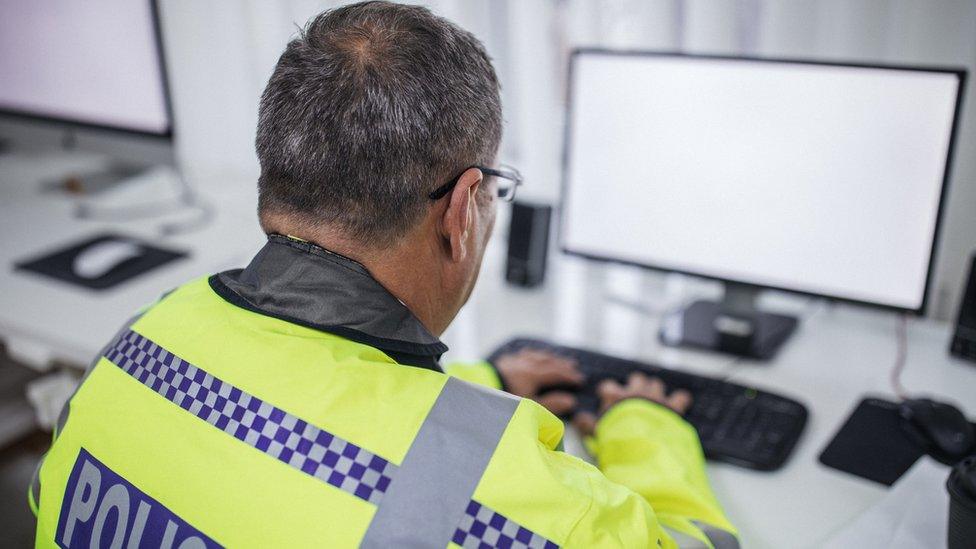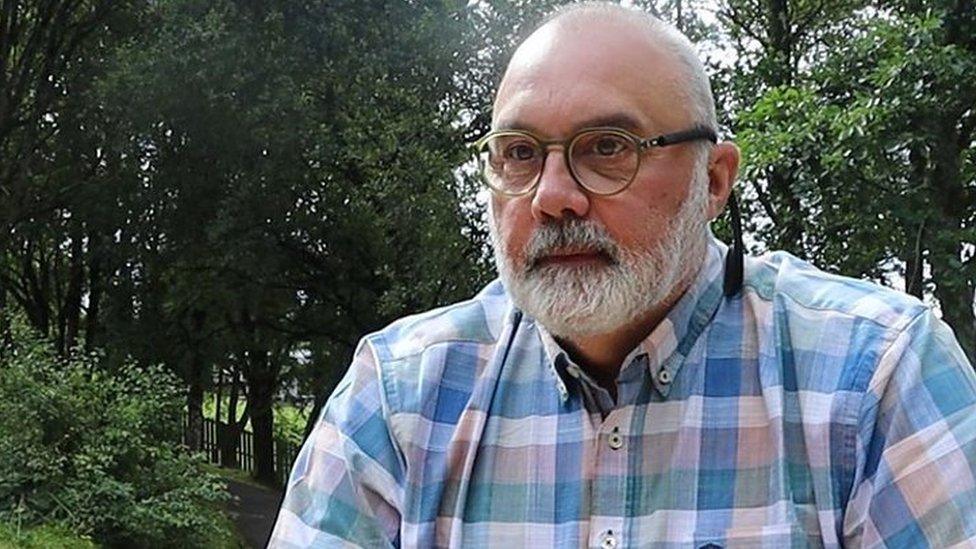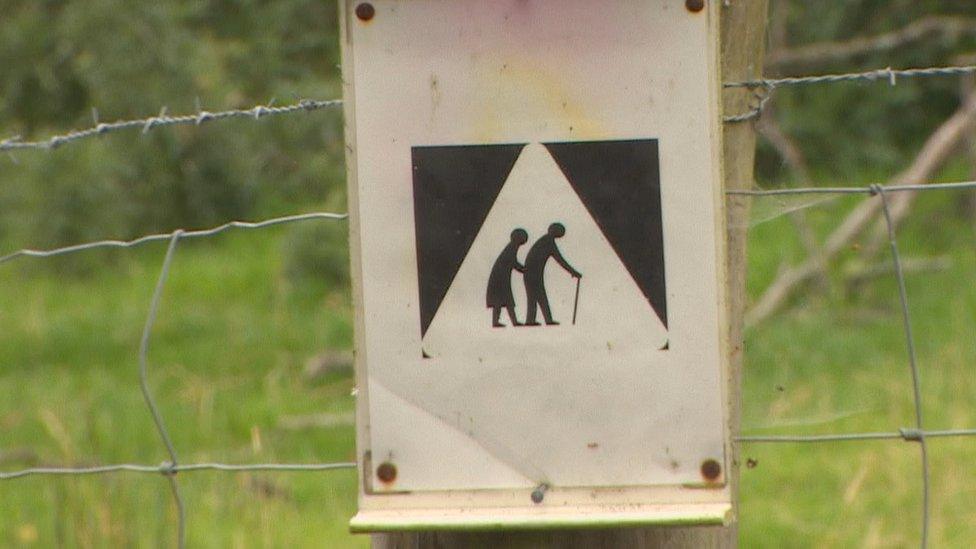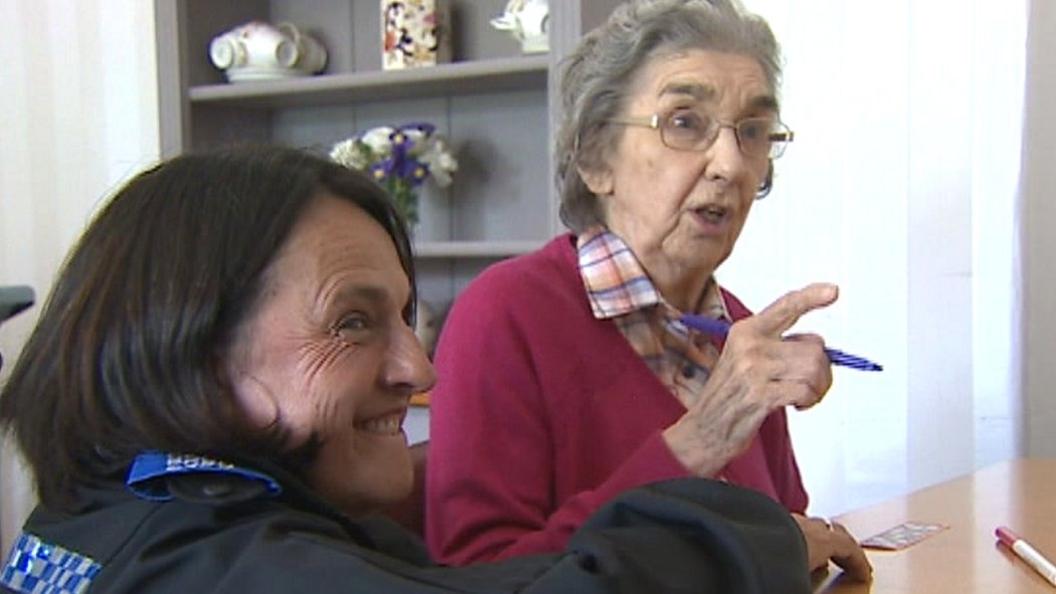Herbert Protocol: Dementia missing person scheme aims to save lives
- Published

Police are provided with personal information in advance, which saves valuable time when every minute counts
A scheme which helps to trace people with dementia if they go missing is being launched in Northern Ireland.
The Herbert Protocol is already used in other parts of the United Kingdom.
Police are provided with personal information in advance, which saves valuable time when every minute counts.
The protocol's introduction was spearheaded by Dementia NI members, with Hazel Haworth from the organisation claiming: "It could save hundreds."
The Herbert Protocol is a simple form that family or people with dementia can download from the Police Service of Northern Ireland (PSNI) website., external
"You fill in the document with various important information, such as a photo, important medical information but also information about the past of the person with dementia," Ms Haworth said.
"Places they would have lived when they were younger, maybe where they went to school, places that they might go back to if they were to get lost. "

Hazel Haworth of Dementia NI said that older memories are often the strongest
She explained that this was very important as when someone's dementia progresses their strongest memories are often older ones.
"The more real and more tangible memories could be ones from when they were in their 30s or 20s or even when they were a child," she said.
"It means that if someone with dementia is out and about, that they get disorientated which can happen, they may try to get back to a place that they've previously known."
In what can be a stressful time for families, Ms Haworth said that the protocol allowed the police to get a head start searching for a missing person, saving valuable time.
"For people in the earlier stages of dementia, it can be really useful to download the Herbert Protocol and fill it in themselves, so that that information is gathered, should it ever be needed in the future."

What is the Herbert Protocol?
The Herbert Protocol is a national scheme being adopted by more and more police forces which encourages carers to compile useful information that could be used in the event of a vulnerable person going missing.
Carers can complete a form recording all vital details, such as medication required, mobile numbers, places previously located and photographs.
In the event of a family member or friend going missing, the form can be easily sent or handed to the police to reduce the time taken in gathering this information.
The Herbert Protocol initiative is named after George Herbert, a World War Two veteran of the Normandy landings, who lived with dementia and died after going missing.

'I just lost all reasoning'
Watch: How the Herbert Protocol will work
Davie McElhinney was diagnosed with early onset dementia five years ago.
Mr McElhinney had a shocking experience of disorientation while on holiday in Scotland with his wife, Alison.
"We went to a shopping centre, which going in I didn't pay much attention to the whole place, but we went to a shop and we got talking to a guy," he said.
"Alison said she was going on to shop and I maybe spent 15-20 minutes talking to the guy."
Mr McElhinney left the shop and at that moment his mobile phone died.
"When I was standing out in the hallway of the shopping centre, it was absolutely massive," he said.
"Just sheer panic, that minute, and I didn't know how I was ever going to meet Alison again in a strange place, not even at home.
"It was just panic and disorientation and everybody's faces started to blur and I just couldn't think properly, I just lost all reasoning."
Fortunately, Mr McElhinney managed to find a security guard who helped him recharge his phone and reunited him with his wife.
Speaking about the protocol, he said: "It gives me a bit of confidence that if I do go missing that the form is there and it is peace of mind for Alison and for the family really."

'Peace of mind'
Ms Haworth said: "There have been experiences in Northern Ireland of people who have sadly gone missing with dementia and haven't been found in time.
"So if this protocol helps one person to be found more quickly, then it is really worth doing.
"But the reality is over the years it will help hundreds of people."
Dementia NI members, who are all living with dementia, realised the need for the initiative to be in place to support them in Northern Ireland and contacted the PSNI.
Ms Haworth said members wanted to be confident in getting out and about, but also wanted peace of mind for their families.
PSNI Supt Julie Mullan said every minute was crucial.
"This scheme has already provided many families and carers in the pilot areas with peace of mind knowing that they are prepared should they need to report a loved one missing," she said.
"If someone you love goes missing it is an incredibly stressful and challenging time, meaning you're not always able to provide answers to the questions that police will ask in order for us to act as quickly as possible."
Health Minister Robin Swann urged people in Northern Ireland to make use of the initiative.
"Having a completed form will give peace mind to people with dementia and their families that should they go missing there is a plan in place to find them safely," he said.
Related topics
- Published21 September 2022

- Published7 September 2017

- Published4 June 2018

- Published23 May 2019
